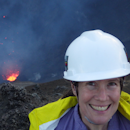Dragonfly: Flights of Exploration Across Saturn’s Moon Titan
- Speaker
-
 Elizabeth Turtle, Ph.D.Planetary Scientist, Johns Hopkins Applied Physics Laboratory, Johns Hopkins University
Elizabeth Turtle, Ph.D.Planetary Scientist, Johns Hopkins Applied Physics Laboratory, Johns Hopkins University
Presidential Lectures are free public colloquia centered on four main themes: Biology, Physics, Mathematics and Computer Science, and Neuroscience and Autism Science. These curated, high-level scientific talks feature leading scientists and mathematicians and are intended to foster discourse and drive discovery among the broader NYC-area research community. We invite those interested in the topic to join us for this weekly lecture series.
Saturn’s largest moon, Titan, is a world surrounded by a dense atmosphere with abundant complex organic material on its surface and a liquid-water ocean in its interior. These properties make Titan a singular destination to seek answers to fundamental questions about the origins of life: What makes a planet or moon habitable? What chemical processes led to the development of life?
In this lecture, Elizabeth Turtle will discuss discoveries about Titan made by the Cassini-Huygens mission. She will also present the Dragonfly mission concept for future exploration of this unique world by rotorcraft. Titan has been revealed to be surprisingly Earth-like, with active geological processes and opportunities for organic material to mix with liquid water on the surface. Dragonfly, which is being studied under NASA’s New Frontiers program, would take advantage of Titan’s dense atmosphere and low gravity to fly from place to place to measure compositions of surface materials and observe Titan’s geology and meteorology. Aerial mobility enables Dragonfly to explore dozens of diverse landing sites. Traveling tens to hundreds of kilometers over its two-year mission, Dragonfly will investigate the habitability of this extraterrestrial environment and chemical processes like those that supported the development of life on Earth.
